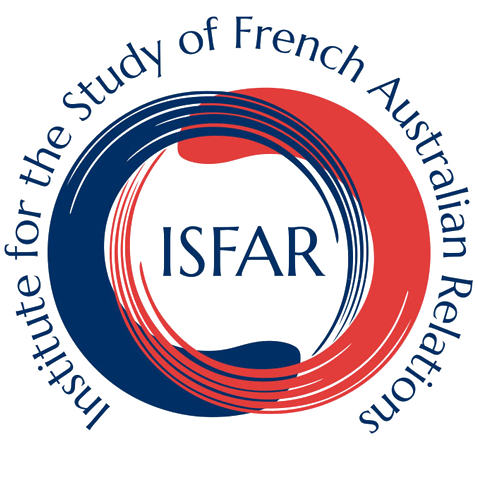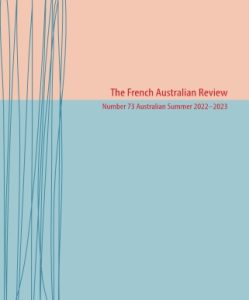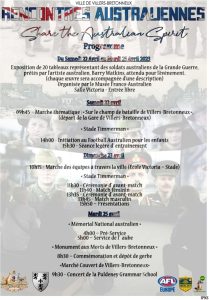Message from the president
It is with great sadness that I open this newsletter with news of the passing of our longstanding and committed ISFAR committee member, Jacques de Saint-Ferjeux on 23 February. Jacques had been a member of the committee since its inception, bringing his gentle wisdom and experience to our discussions. You will find a link to a news article on Jacques published on the Bleu Blanc Rouge blog of the Honorary French Consulate in Melbourne here and below, a personal reflection on Jacques written by another longstanding and committed ISFAR committee member, Adjunct Professor Stephen Alomes.
Other items in this newsletter include details on the forthcoming issue of The French Australian Review, our biennial symposium to be held in April, the first Melbourne Salon for 2023, and a profile of ISFAR Secretary, Dr Pauline Gerogelin.
Comte Jacques Henri Pollet de Saint-Ferjeux (Jim) — A personal reflection
When I first met Jacques, very early in the ISFAR story, I took to him immediately. His warmth and natural rapport called me. It was mirrored by his wife Marjorie whom we met at several ISFAR functions.
While Oz Francophile culture once had rare moments of rather dignified ‘politesse’, Jacques was always more natural. Jacques happily accepted the Oz culture shortening and simplification (‘Jim’), although I always called him Jacques.
He was a man of many parts.
An early teacher of computing through the Ed Department correspondence school based in South Melbourne, he also had a personal obsession — table tennis. I learned just now that he also had an interest in fumigation research — something most interesting now we recognise aerosol transmission of viruses and the health costs of particulates in the air.
I must have seen his full name with the title — Comte — somewhere. Comte Jacques Henri
Pollet de Saint-Ferjeux.
I only became more aware of his status as the Grand Homme of his French family after, by chance, we had a long and amusing discussion at Tullamarine before separately heading to Europe. He was worried about having to make an important speech at a family function, although he was devoid of hierarchical assumptions. I gave him what we agreed was good advice, now forgotten by me too.
At a Bastille Day fair at the State Library I discovered another part of his story. The ISFAR table was near the French veterans table, the anciens combattants, and Jacques introduced me to some other nice blokes, his veteran colleagues. Of course, I can’t remember dates and details of their service but perhaps Algeria.
Jacques was always a charming and calming at ISFAR committee meetings, his very presence and his smile offering lubrication at key moments. In fact I once did a quick sketch of him on the back of the meeting agenda. I hope it captures his charm.
We will miss our friend and colleague Gentleman Jacques very much.
Stephen Alomes
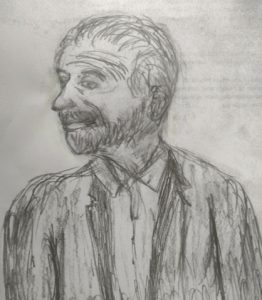
Sketch of Comte Jacques Henri Pollet de Saint-Ferjeux
Credit: Stephen Alomes
The French Australian Review no. 73
For various reasons The French Australian Review no. 73 will arrive in your mailboxes a little later than usual. The editors apologise for this delay and express their thanks to those ISFAR committee members who helped them overcome a number of unexpected challenges to present a full issue of the Review — with three peer-reviewed articles, two opinion pieces, several documents, three book reviews and the usual Bibliographical Notes.
The first of the three articles documents the comings and goings, between Australia and France, of the French composer and pianist Henri Kowalski. Kowalski spent twelve years in Sydney from the mid-1880s as well as some time in Melbourne and on tours to regional centres. His friendship with the Australian writer Marcus Clarke resulted in Clarke writing a libretto (which remained unfinished at the time of Clarke’s death) for a comic opera composed by Kowalski, called Queen Venus. The various iterations of this work are documented by Kerry Murphy, Professor of Musicology at the Melbourne Conservatorium of Music, as it was presented in Brussels, Paris, Sydney and Melbourne. It is a fascinating story of what Murphy calls ‘cultural entanglement’.
Véronique Duché, A.R. Chisholm Professor of French at The University of Melbourne, and Amanda Laugesen, Director of the Australian National Dictionary Centre at the Australian National University, have undertaken further research into the trench journals and periodicals produced during and after the First World War. This article explores the concepts of places of memory (lieux de mémoire) and places of commemoration (lieux de commémoration) to gain insights into the diggers’ memories of language and place.
The third article is by Edoardo Brunetti, a PhD student at RMIT University. It examines ethno-regionalist movements in Occitania and Brittany. Brunetti reflects on his own identity, having grown up with Italian and Croatian influences, and then identifies some examples of demands for political autonomy in Australia and its offshore territories, before exploring Occitan and Breton ethno-regionalism.
Issues of identity and place re-emerge in Katherine Hammitt’s interview in French with Christian Robert, the founder of Au vent des îles publishing house in Tahiti. As well as discussing the history of publishing in Oceania, Robert emphasises the importance today of Oceania’s books and writers in a global context. Another interview, first published in the newsletter of AFRAN, is with archaeologist Emilie Dotte-Sarout who explores the work of early women archaeologists in the Pacific.
Two opinion pieces, one by David Camroux, Senior Research Fellow and Adjunct Professor at Sciences Po in Paris, and the other by former FAR editor, Ivan Barko, Emeritus Professor of French at the University of Sydney, address the constantly evolving nature of the relationship between France and Australia, in response to the prevailing political winds. The issue concludes with three shorter documents by Tom Thompson, Peter Hodges and Edward Duyker, three book reviews and the usual Bibliographical Notes.
Copies of the Journal and/or of individual articles are available for purchase. Please go to: https://www.isfar.org.au/journal/
ISFAR Symposium 2023, 13–14 April
New Perspectives in French-Australian Studies
You are warmly invited to attend the 2023 biennial ISFAR Symposium, to be held online on Thursday 13 and Friday 14 April. Some sessions will be held in the early evening in order to include our French colleagues. Attendance is free. For members and attendees living in Melbourne, a dinner will be held on Friday 14 April, details to come.
Keynote sessions include Professor Matthew Graves (Aix-Marseille University) on Le Géographe Revisited: Unofficial Diplomacy in Post-Federation French-Australian Relations:
The role of learned societies, la Société de Géographie in particular, in fostering ‘soft diplomacy’ will be illustrated through the Fleurieu missions undertaken in the wake of Federation and the Entente Cordiale “on matters of geographical interest to Australia”.
And Nic Mclellan on Silenced Voices in the Indo-Pacific:
Even as politicians in Paris and Canberra strengthen the Indo-Pacific strategic partnership, Indigenous voices are often missing in the debate on France-Australia relations in Oceania. In this presentation, journalist and researcher Nic Maclellan will reflect on Pacific perspectives in the age of AUKUS.
The Symposium includes sessions on a wide range of French-Australian topics: the representation of Indigenous Australians in French children’s books; sport; socio-cultural political misunderstandings; families and individuals who acted as ‘cultural brokers’ between the two nations; the influence of French cuisine and much more.
For more information: alexis.bergantz@rmit.edu.au; elizabeth.rechniewski@sydney.edu.au
Eventbrite link for registration: https://www.eventbrite.com.au/e/new-perspectives-in-french-australian-studies-tickets-563725808067
ISFAR AGM
The ISFAR AGM was held on Monday 20th March from 5.30-7pm. The new committee members for 2023 are:
President: Kerry Mullan
Vice President: Véronique Duché
Treasurer: Richard Miller
Secretary: Pauline Georgelin
Co-editors FAR: Elaine Lewis and Jane Gilmour
Newsletter Editor: Robyn Stern
Ordinary Committee members: Stephen Alomes, Alexis Bergantz, Chantal Crozet, Briony Neilson, Graham Neilson
We welcome Briony Neilson to the committee and we thank Lina Vale for her extensive contributions as copy editor in recent years.
The committee would also like to acknowledge the passing of two very valuable members of ISFAR since our last AGM. First, founder and former President of ISFAR, Professor Colin Nettelbeck, on 21 October 2022, and more recently, longstanding and committed OC member, Jacques de Saint-Ferjeux on 23 February this year (see above). We will greatly miss them both at our future meetings.
SAVE THE DATE!
Thursday 27 April 2023 18:00-20:00h
France and Australia cultural differences
Sabrina Teller, cross cultural consultant
in conversation with Kerry Mullan
Do you want to make the best of your expat experience?
Confused why your team does not work the same way as in your home country?
Frustrated dealing with cultural differences in your host country?
Based on her personal experience and her 20-year career as an international business manager, Sabrina will present an overview of cultural intelligence and how this can help us understand the cultural differences between France and Australia. Sabrina will also discuss key cultural dimensions where French and Australians have different ways of working which can impact on performance when working together and advise how we might go about navigating culture shock and dealing with unfamiliar communication styles.

As a cross-cultural consultant and trainer, Sabrina Teller is dedicated to helping executive expatriates adapt to their new working environment as well as helping multicultural teams to work successfully together, through cultural consulting and awareness programs.
https://www.sabrinateller.com/
Kerry Mullan is Convenor of Languages at RMIT University, President of ISFAR (Institute for the Study of French Australian Relations) and Convenor of The Melbourne Salon
Venue: AFM Pop Up in the CBD: Madame Brussels Lane, 50 Lonsdale Street, Melbourne
Booking information to follow
Inaugural Congress of Laureates of French Academic Palmes in Australia
On Thursday 2nd of March, the first gathering of the recipients of the French Order of Academic Palms was held in Canberra.
The Palmes Académiques are the oldest of the French distinctions awarded in a civil capacity. They were created by decree of March 19, 1808 on the organisation of the Imperial University under the Emperor Napoleon I. The current Order was established by the decree of 4 October 1955.
This inaugural Australian Congress explored ways to expand academic networks between France and Australia, including connecting with the global Association of the Order of Academic Palms. It also contributed to finding new ways to provide mentorship to the Australian-French Association for Research and Innovation (AFRAN) researchers and other French-Australian academic organisations, such as ISFAR.
This event was supported by the AFRAN, the Embassy of France to Australia and the ANU Centre for European Studies. It was an opportunity for the laureates to discuss various topics such as sciences and innovation and arts and culture. ISFAR looks forward to being an active participant in future gatherings of the network.
Profile — Pauline Georgelin, ISFAR Honorary Secretary
My involvement with ISFAR dates back to 2013. That year, I met Colin Nettelbeck at a function and got talking about my interest in French-Australian connections. I had always maintained a connection to France since majoring in French and Italian as an undergraduate (quite a few years ago!) My interest in French-Australian connections was inspired by my research about my grandfather’s experiences in the First World War as a French speaking soldier in the Australian Army. I wrote about this in the special World War I issue of the French Australian Review (Number 59, summer 2015–16).
Becoming involved in ISFAR opened up a whole new world of possibilities, as I realised what a rich and fascinating area of research this was. I am deeply grateful for the chance meeting with Colin Nettelbeck who encouraged me to transform my interest into a more serious and academically focused endeavour. I am equally grateful that Colin introduced me to Professor Véronique Duché, at the University of Melbourne, who agreed to be my PhD supervisor. My thesis examined French-Australian identities and French-Australian relations during the First World War. Véronique was an inspiring, supportive and patient supervisor and mentor. Not only that, but she courageously dealt with enormous amounts of bureaucratic paperwork to enable me to enrol for a joint PhD (Cotutelle) at Université Paris-Nanterre.
Meanwhile, after serving on the ISFAR Committee for a couple of years, I was elected as the honorary secretary in 2016. This has been a very rewarding role. One part of my job which ISFAR members will know about is to remind you when your membership is due! However, there is more to it than that! One of the most enjoyable aspects of the role is the people. It is inspiring to be part of such an amazing community of like-minded people: the ISFAR committee members and the wider community of ISFAR members. My fellow ISFAR committee members are such a hard-working and committed bunch — it has been great to be part of this team. I have also enjoyed getting to know some of the ISFAR members and becoming more aware of the all the different ways that French-Australian connections are forged and strengthened. As I have become more engaged in French-Australian relations in current day Melbourne, I have added an extra string to my bow and I am now also the secretary of the organising committee for the Bastille Day French Festival. I look forward to continuing these French-Australian connections.
France Australia Wine project
Louis Edouard Bourbaud: a footnote, and RetroNews
The biography of Louis Edouard Bourbaud, the first viticultural expert appointed in Australia, has now been posted online in the FADB. At the same time a correction has been made to the mini-bio on France Australia Wine, showing his birthplace as Chérac, a small town in the Charente-Maritime department, rather than Cognac, some 10 kilometres distant in the Charente.
All the available evidence indicated Cognac as the town where Bourbaud was born; as a more recognisable place, no doubt he preferred to give this as his birthplace rather than enter into lengthy explanations of Chérac. Further, he lived in Cognac after his marriage.
I would never have questioned the evidence, but I was searching for more information on Bourbaud’s life before emigrating to Australia — specifically, details of his viticultural experience — and contacted the Municipal Archives in Cognac. The reply corrected the information re birthplace and directed me to resources in the neighbouring department, where the very helpful Association des Généalogistes de la Charente and the Cercle Généalogique à Saintes provided me with a full Bourbaud geneaology.
Although no details on Bourbaud’s vitcultural education and experience were included, the information gave me a few more clues to continue my research through RetroNews, the French counterpart to Trove, albeit far more extensive: more than 2,000 newspapers and journals published from 1631 to 1951.
RetroNews is available on subscription, about $15 per month. Subscriptions can be cancelled at any time and reinstated later if required. The data base is searchable, and searches can be refined by date, place (town of department), theme, title of publication. It suffers from the same text recognition limitations as Trove but these can be minimised by the exclusion of certain terms in the search.
I have used RetroNews extensively in my research and found it very useful, if occasionally frustrating. For example, it located an 1842 review of a book now available only in its second (1858) edition.
Anyone interested in contributing to the research for France Australia Wine can contact me at barbara.santich@adelaide.edu.au.
Barbara Santich
The Berthe Mouchette competition prize giving ceremony
ISFAR was proud to once again sponsor the Alliance Française Berthe Mouchette Competition in 2022. The theme of the 2022 competition was ‘La Liberté’. The awards ceremony was held at the St Kilda Town Hall in December. ISFAR secretary Pauline Georgelin attended the event on behalf of ISFAR and handed out prizes to the Year 9 winners.
It was a wonderful evening. Every year, the students work so hard to learn their poems. Some of the younger ones choose to illustrate their chosen poem, while the more senior students are also able to compete in more challenging written and spoken French tasks. Many of the winners recited their poems again on stage at the awards ceremony, and their talent, enthusiasm and passion for the French language was inspiring. ISFAR is very pleased to continue its support of the Berthe Mouchette Competition, and we congratulate all the winners, and say well done to all who competed!
Those interested in learning more about the competition can find further information on the following website: https://www.afmelbourne.com.au/schools-and-teachers/bmc/
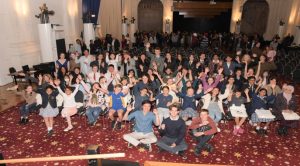
The 2022 Berthe Mouchette Competition winners receiving their awards at the Awards Ceremony held at the St Kilda Town Hall in December 2022
Credit: HM Photos

ISFAR Honorary Secretary Pauline Georgelin with one of the prize winners
Credit: HM Photos
Links to current and upcoming events and exhibitions
Visit the Lume Melbourne to experience the immersive Monet & Friends, an epic adventure into French impressionism. Open from 26 October 2022 to 30 June 2023.
With rave reviews from around the world, Paris Combo is returning to Australia for exclusive Australian and Adelaide-only appearances.
This iconic French ensemble wins over crowds and critics alike with their fun-loving mix of swinging gypsy jazz, cabaret, French pop and world rhythms. For three nights only (9-11 June), the group will perform as a special 10-piece line-up inviting guest vocalists Carmen Maria Vega, Billie, Aurore Voilqué and Mano Razanajato.
Together they pay a vibrant tribute to Paris Combo’s late songwriter and charismatic chanteuse Belle du Berry. This unique celebration will include the songs that have made Paris Combo a favourite on the international scene and selections from their final studio album with Belle, “Quesaco?”.
“If music be the food of love, then Paris Combo is a banquet.”
— The Advertiser
For more French-related events, see https://sacreblue.org/ (Facebook https://www.facebook.com/sacrebluewaves/)
Items of interest
Sylvie Brassard (PhD student in French Studies) and Paul Gibbard recently gave an interview on ABC Radio Perth about the French explorer Paul Gaimard who visited Shark Bay in 1818 with the Freycinet expedition. Gaimard’s journal is a prized document in the collections of the State Library of Western Australia. You can find the interview here (between 1h 40 and 1h 54): https://www.abc.net.au/perth/programs/wa-afternoons/afternoons/101962566
2023 Australia-France Social Science Collaborative Research Program winners have been announced. Four teams of social scientists from Australia, France and the Pacific will receive a boost towards interdisciplinary research projects tackling major societal issues, thanks to $20,000 in funding from the Embassy of France in Australia and the Academy of the Social Sciences in Australia: https://socialsciences.org.au/news/2023-australia-france-social-science-collaborative-research-program-winners-announced/?utm_source=ActiveCampaign&utm_medium=email&utm_content=Academy+News+March&utm_campaign=Academy+News+March+2023+%28Copy%29
Australian events in France
33e Carrefours de la pensée : Australie rêves et réalités 17-18 March 2023
Depuis plus de trente ans, les Carrefours de la Pensée sont un des moments importants de la vie culturelle du Mans. Les Carrefours de la Pensée de 2023 traitent de l’Australie. Les raisons qui ont conduit le Conseil d’administration de l’association à faire ce choix sont les suivantes : l’importance géopolitique grandissante de ce pays-continent (une superficie qui équivaut à 14 fois la France) se situant aux confins du sud-est asiatique et du Pacifique, la richesse des problématiques pouvant être présentées au public (environnement, climat, peuple premier, relations internationales, attractivité…) et le fait que l’Australie n’a pas jusqu’à présent été présentée aux Carrefours et reste encore mal connue. Par ailleurs, par-delà son public de fidèles participants et participantes, il nous a semblé que ces Carrefours étaient en mesure d’intéresser vivement les jeunes sur lesquels l’Australie a un fort pouvoir de séduction.
Recordings of all talks available at : https://www.youtube.com/playlist?list=PL95OTiveOllhcQhvPXgi1x_RlDQeCxHOM
Musée du Quai Branly 4 April – 2 July 2023
SONGLINES : Chant des pistes du désert australien https://www.quaibranly.fr/fr/expositions-evenements/au-musee/expositions/details-de-levenement/e/songlines
Villers-Bretonneux 22-25 April
A l’occasion des commémorations de l’ANZAC Day, la mairie de Villers-Bretonneux (Somme) et l’Association Bretonvilloise Animation vous invitent à participer aux “Rencontres Australiennes” du 22 au 25 avril.
Au programme :
- Une exposition de 20 tableaux de l’artiste australien Barry Watkins
- Une initiation au football australien pour les enfants et des matchs féminin et masculin
- Une marche sur le thème de la bataille de Villers-Bretonneux lors de la Première Guerre mondiale
